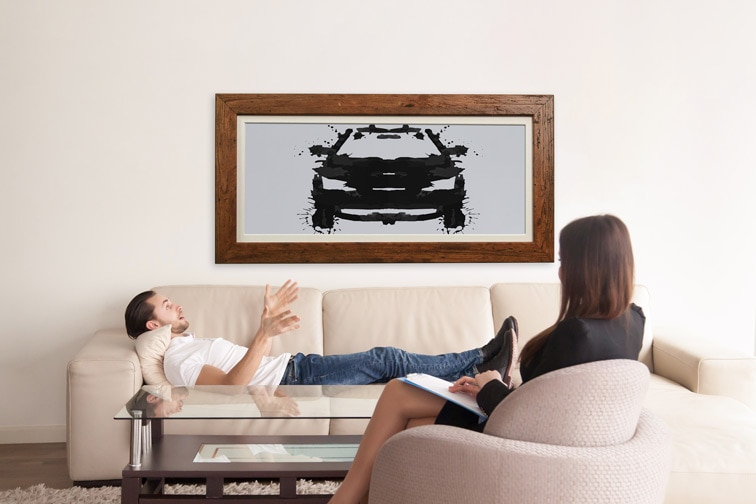Wonder Why You Dread Car Buying? A Famous Psychologist Explains
The author of The Paradox of Choice gets to the root of our car-buying anxiety.
 Capital One
Capital One
Updated on August 12, 2019
“Stressful, painful, and panic-inducing.”
These are just a few of the ways people regularly describe the traditional car-buying process. There’s also “irritating and overwhelming.”
“It just plain sucks,” comes up a lot, too.
In a 2014 survey of 1,000 Americans conducted by the automotive website Edmunds, most said buying a vehicle was more stressful than getting married or going on a first date. And
Clearly, people, we’ve got issues.
So, we decided to seek some professional help.
Psychologist Barry Schwartz literally wrote the book on consumer anxiety in the modern age. His “
His premise is simple, if a bit foundation-shaking: The more choices we Americans have, the less satisfied we become.
If you buy the wrong cereal, you get to correct that mistake next week. Large decisions are not easily reversible. That’s why there is extra anxiety baked into them.
In a society built on freedom of choice, self-determination, and endless flavors of frozen yogurt, it’s a tough theory to swallow. But when you begin to consider all the choices we make – whether it’s from 100 breakfast cereals, 200 cell phone plans, or 300 cars and trucks – Professor Schwartz’s paradox begins to sound like sage wisdom.
Big-ticket purchases, such as a new vehicle, can be particularly paralyzing.
“If you buy the wrong cereal, you get to correct that mistake next week,” Schwartz said in a recent phone interview. “Large decisions are not easily reversible. That’s why there is extra anxiety baked into them.”
Schwartz, who retired recently from Swarthmore College near Philadelphia and is now teaching part time at U.C. Berkeley, was nice enough to help us explore our feelings of inadequacy when it comes to car buying, and how some of our angst may be rooted in past experiences and a fear of negotiation. He even shared some impressions from his latest vehicle purchase, and how he occasionally feels a pang of buyer’s remorse.
Here are some notes from our car therapy session:
Q. YOUR BOOK SEEMS TO STRIKE AT THE HEART OF THE PROBLEM. ARE THERE JUST TOO MANY CARS, TRUCKS, AND SUVS TO CHOOSE FROM?
A. Oh, absolutely. But I don’t think it’s the whole problem. The fact that you are expected to negotiate prices adds a layer of worry, and there’s a feeling that you need to put your armor on. When you go into a department store, you don’t worry (about negotiating) to buy a pair of pants.
But having just bought a car a year ago, you start looking at everything, and it becomes completely overwhelming. Just figuring out the right car. It’s torture. And you start thinking maybe a bike, maybe a horse, maybe a horse and wagon.
Q. SO HOW DID YOU HANDLE IT?
A. We live in Berkeley, (Calif.), and the official car of Berkeley is a (Toyota) Prius. So, that’s where we started. But my wife didn’t like the sight lines, and eventually we ended up buying a Kia Soul, because it’s high up. You feel like you’re driving an SUV, and we like it fine. But there was nothing about the process that was the least bit enjoyable. Quite the opposite.
Q. WHAT DIDN’T YOU LIKE ABOUT IT?
A. There were way too many choices! And this is after a lot of arbitrary restricting of choices that we did. There were manufacturers we didn’t even look at. And, for all I know, we left more attractive options on the table.
But we just didn’t want to do the months of work and research it would have taken to figure out the perfect car to buy. So we solved the problem by deciding we didn’t need to buy the best car given our budgetary targets. But still, you buy a car and you’re left with this lingering feeling that you made a mistake, or you missed an opportunity. All the stuff that I write about in the book.
Q. DO YOU HAVE BUYER’S REMORSE?
A. Once in a while, I do. I see some car driving by, and I think that might’ve been better. If our lives were more wrapped up in driving, I suspect our buyer’s remorse might also be bigger. Which is not to say we made a mistake … but it’s possible. And that’s the problem.
Q. YOUR BOOK MAKES THAT POINT – MORE CHOICES, MORE CHANCE FOR REGRET. BUT IN AMERICA, WE PUT A PREMIUM ON FREEDOM OF CHOICE. HOW DO YOU EXPLAIN YOUR PREMISE TO SKEPTICS?
A. A few years ago, a Fortune 200 [home] developer asked me to give a talk. Their standard thing is to create a development that has eight different model homes, and then you go to the design center and outfit the house. When you look at all the options—paint, tile, appliances--you could probably create 30 million different houses. And the problem is, A) that’s expensive for them, and B) it takes more time to build a house.
But the main thing was that people were spending an average of 20 hours in the design center with a consultant, making all these choices, and they ended up less satisfied. So, they decided to reduce the options for customizing in most categories, and time spent in the design center dropped from 20 hours to four, and satisfaction went up. And this is completely consistent with the story that I tell.
When there are fewer options, you walk away with less doubt about the options you’ve chosen. In addition, people bought more upgrades, so the developer made more money and their JD Power Ratings were through the roof. A light bulb went off.
YOU MAY ALSO LIKE:
Say This, Not That At a Car Dealership
The 5 Best Times to Buy Your Next Car
5 Steps to Finding the Right Car
Q. DO YOU THINK CARMAKERS WOULD BE BETTER OFF WITH FEWER OPTIONS?
A. Yes! Fewer models and fewer options. Toyota some years ago, I think, started this procedure where there’s a low, medium, and high-end version of each model. What that effectively does, it makes the choice problem much less acute. And in theory people would not like this, right? Because you’re paying for things you don’t want. But in practice, I think, they do like it because it simplifies their task.
Q. IS THAT THE ROOT OF WHAT PEOPLE NEED: SIMPLER CHOICES?
A. Yes, they need it for cognitive reasons – it makes the problem soluble rather than insoluble. And they also need it because it will end up increasing their satisfaction with whatever decision they make.
Q. SO IF YOU WERE COUNSELING SOMEONE WHO JUST DREADS BUYING A CAR, WHAT ADVICE WOULD YOU GIVE THEM?
A. I’d say, sit down and think about the two or three things that are most important to you in a car – mileage, reliability, safety, room, whatever they are – and then ignore everything else.
Q. WHAT DO YOU THINK DISTRACTS PEOPLE FROM DOING THAT?
A. I think what ends up happening, and there’s a little bit of research suggesting it, that if you sit down and figure out exactly what matters to you in a choice then more options are better. You are essentially pattern matching. But nobody does that.
What people do is they identify a couple of things they care about and then they let the market figure out the other things. So, they go with a partial understanding of what matters and then they are overly influenced by attributes they don’t really care that much about. And that’s when they get into trouble.
I don’t know how you turn that off, it’s not easy, because all these car companies are trying to get you to pay attention to exactly the things I’m telling people they should ignore.
Q. IF PRICE IS ONE OF THOSE MUST-HAVES, DOES THAT ADD ANOTHER LEVEL OF STRESS?
A. In some ways, price helps the choice problem because now you’ve got a budget constraint that’ll rule out lots of options. But it may be that your budget constraint is severe enough that you simply can’t get the car that has the attributes that matter most to you. Also, I do think negotiating a price adds a level of stress.
Q. DO PEOPLE HAVE AN OLD NOTION OF WHAT IT’S LIKE AT A CAR DEALERSHIP?
A. It takes a long time for a set of cultural associations to get modified, and I do think that online research has streamlined the way you’re treated by salespeople.
More people come in better informed, not only about the various options but also about what a reasonable price to pay is. You can do your comparison shopping, more or less, without ever leaving your living room.
Q. DID THAT MAKE THE OVERALL EXPERIENCE BETTER FOR YOU?
A. We did a fair amount of research online, and [the dealer] did nothing to try to influence our decision. It was remarkable. It was the fastest experience of car-buying I’ve ever had. They didn’t try to sell us options we didn’t want.
We wanted some of the safety options, like automatic braking, and you could get that on the Soul, but it only came on the luxury option, which cost a lot more, and most of that was to pay for things we had no interest in. That was frustrating, and we ended up deciding that we would just drive carefully.
Q. SO, IN THAT CASE YOU WANTED MORE CHOICE?
A. Exactly.
Q. IF YOU COULD BE THE VOICE INSIDE A CAR BUYER’S HEAD, WHAT MANTRA WOULD YOU GIVE THEM?
A. Keep the main thing, the main thing. Figure out what matters to you, and don’t be distracted by other things. And don’t worry there’s something better that you missed.
With Dr. Schwartz’s knowledge in mind, we asked him to help us adapt his steps to a good decision (found in The Paradox of Choice) to the car buying journey. If you want to read up on the five steps to finding the car, click here.
Written by humans.
Edited by humans.
This site is for educational purposes only. The third parties listed are not affiliated with Capital One and are solely responsible for their opinions, products and services. Capital One does not provide, endorse or guarantee any third-party product, service, information or recommendation listed above.
The material provided on this site is not intended to provide legal, investment, or financial advice or to indicate the availability or suitability of any Capital One product or service to your unique circumstances. For specific advice about your unique circumstances, you may wish to consult a qualified professional.
 Rick Press
Rick PressAfter a long career as an editor for a major metropolitan newspaper and website, in 2017 I joined Capital One as its Managing Editor for Auto Content. I’ve been fortunate to cover everything from breaking news and Super Bowls to CEOs and celebrities, and now I am excited to explore the connection we all have to our cars and help consumers navigate the car-buying journey. Let’s ride!
Related articles
View more related articles